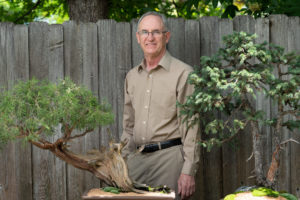
Darrell Whitley, a professor and former chair in the Department of Computer Science at Colorado State University, was awarded the Pioneer Award in Evolutionary Computation from the Institute of Electrical and Electronics Engineers (IEEE).
Receiving this award from the IEEE, a nationwide professional association for electrical and electronics engineers, is quite an honor.
“The IEEE gives three awards each year in areas related to AI and computational intelligence,” Whitley said, “But there is typically only one award in each area.”
Alongside Evolutionary Computation, the award focuses on Neural Networks and Fuzzy Logic, a computational approach based on degrees of truth rather than simply true or false.
The IEEE presented Whitley with the Evolutionary Computation award based on his research contributions to the field.
To receive an award from the IEEE, researchers must first be nominated, and an awards committee ultimately makes the final decision.
Whitley was cited for his early contributions to the practical implementation and theoretical understanding of evolutionary algorithms.
In this area, Whitley introduced new algorithms used to research genetic evolution using computational methods.
“I created the first ‘Steady-State Genetic Algorithm’ and also provided a publicly available free software implementation,” Whitley said.
A Steady-State Genetic Algorithm is a computer model that pulls two parents from a population, recombines them to create one child, then inserts the child back into the population to maintain its original size. In most genetic algorithms the children replace the parents, but in a Steady-State genetic algorithm, the child replaces the weakest member of the population.
There are now more than 270,000 citations to the Steady-State Genetic Algorithm on Google Scholar alone.
Along with the creation of a Steady-State Algorithm, Whitley created a few other new approaches to the field of evolutionary computing.
Namely, Whitley created exact mathematical models that can describe the behavior of genetic algorithms, as well as introduce new ways of performing selections within the genetic algorithms.
“My most recent work actually takes some of the randomness out of genetic algorithms,” he said.
In this work, Whitley proved that computation can be done in constant time. Constant time means that the algorithms run for the same amount of time no matter how much information there is.
This is not the only award that Whitley has received recently, he also became a Fellow of the Association for Computing Machinery, one of the computing field’s most distinguished professional societies, in 2019. Whitley said, ”ACM Fellows make up less than one percent of the ACM membership.”
While Whitley’s contribution to computational research is significant, he is thankful to receive another award.